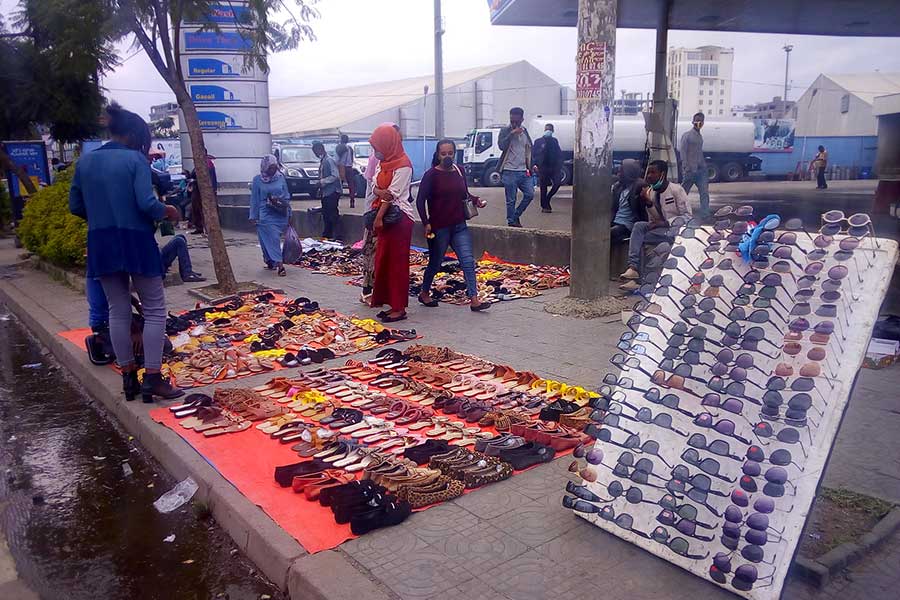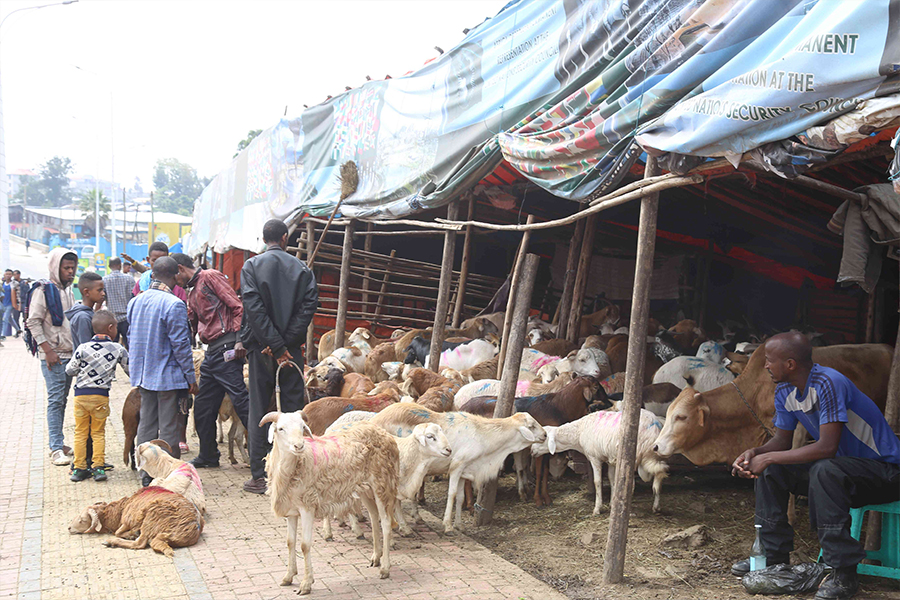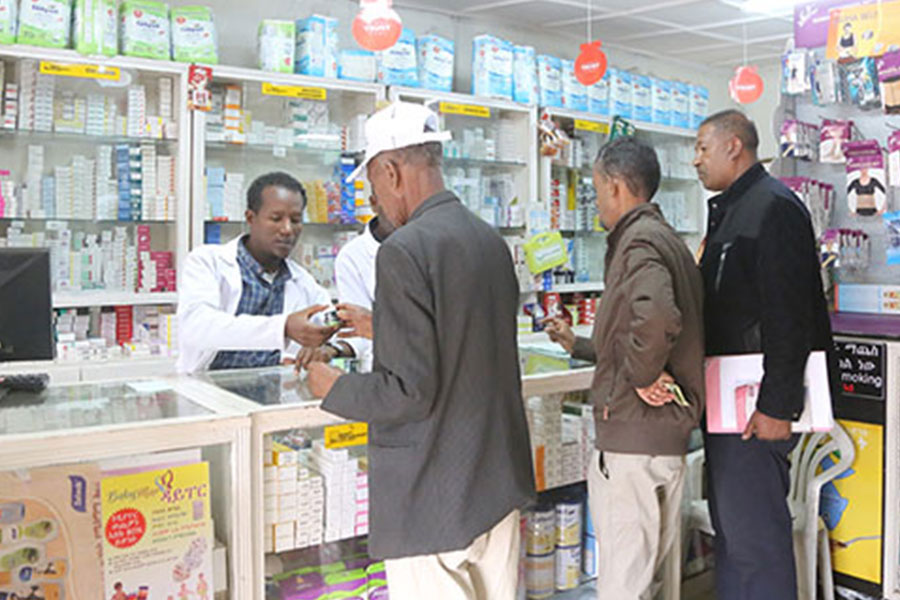
Mar 27 , 2021
By Eden Sahle
Last Friday, around 8:00pm, I witnessed a crime first-hand in the area known as Sheger by the roundabout past Bole Medhanialem Church. A skeletal-looking young man approached the vehicle window, flashing a small hand light in our eyes. He offered us a substance packed in a small transparent plastic bag. We closed the windows and told him we did not want any drugs. He kept pestering us without shame.
We had to drive past to avoid him but could not go too far as we were waiting for someone. We could still see him standing at the spot we left. Several vehicles came and went, purchasing his merchandise, which was likely cannabis, a psychoactive drug. To our shock, his customers were not just young people but also people who were obviously in their 40s. Transactions were completed in a second.
This crime – selling a substance outlawed in Ethiopia – is not an isolated event. It also happens in broad daylight, as normalised as buying coffee.
A few steps away from the spot where this thriving "business" is taking place, I met with two policemen to whom I reported the crime. They were not surprised. They knew what takes place and admitted that things are out of their hands as the offenders get arrested and come out of prison a month later to repeat the same crime.
Indeed, a weak policing and justice system, underfunded security apparatus and minimum sentences are encouraging factors that allow such crimes to thrive. The most significant incentive, unfortunately, for underground drug markets to exist is demand, nonetheless. Such stubborn crime constitutes a serious challenge that must be met with a strong response from police, courts and the public.
The spread of the illegal substance market damages individuals, families, societies and the country. From high schools and universities to working places, youth have become major customers of the drug market. This has taken place under an atmosphere of public apathy, where it is not unfamiliar to see high school students smoking on the streets wearing their uniforms.
Having teenagers and young adults whose psychological, physical and mental wellbeing is harmed by substance abuse is a huge economic and social loss for Ethiopia. Unlike how it is understood in many cultures, addiction distorts chemicals within the brain, especially dopamine. In as far as it distorts the mechanisms within our bodies, addiction technically constitutes a disease.
A country that is in desperate need of skilled human power should not stand by in the face of a thriving underground illegal substance market, as users will be faced with declining academic and professional performance, increased risk of contracting diseases and psychiatric disorders.
Medical doctors warn that substance abuse inflicts a severe toll on public health. Beyond health damage, people under the influence of drugs also pose significant safety risks and costs, such as car accidents. Heavily addicted users also often resort to criminal activities such as theft to raise funds for their drug supply. The serious damage of the habit also poses unnecessary expenses in healthcare. Worse still, it could result in death, as witnessed by the 167,000 people that lose their lives annually, most of them under 50 years of age.
The severity of the problem demands tireless action from security forces, society and schools to work on prevention, education and intervention, including treatment and rehabilitation of those already impacted.
Specific and consistent national abuse prevention programmes can create informed communities and families. It will establish and provide the public with the skills to pass on and to make healthy choices and decisions for the benefit of themselves and the nation. Community-based approaches to prevention and helping those who have already fallen victim to drugs could be vital to avoid substance dependence.
Just like any other crime, law enforcement is another crucial element in this. In concert with the public, the sources and underground supply chain should be constantly monitored and broken. Individuals earning income from the underground market and users should receive rehabilitation and engage in formal employment.
But crimes thrive mainly as a result of the demand out there. It is necessary to have community-level support programmes targeting rehabilitation and, most importantly, instituting social safety net and employment opportunities. Few things push people closer to substance abuse more than poverty and destitution if the glue-sniffing homeless children on the streets of Addis Abeba are any indication.
PUBLISHED ON
Mar 27,2021 [ VOL
21 , NO
1091]

Radar | Feb 01,2020

Radar | Nov 21,2020

Agenda | Sep 10,2022

Editorial | Feb 05,2022

Commentaries | Dec 25,2018

Fortune News | Sep 18,2022

Fortune News | Oct 30,2022

My Opinion | Aug 22,2020

Fortune News | Apr 17,2020

Radar | Apr 27,2025

Photo Gallery | 174154 Views | May 06,2019

Photo Gallery | 164378 Views | Apr 26,2019

Photo Gallery | 154511 Views | Oct 06,2021

My Opinion | 136642 Views | Aug 14,2021
Editorial | Oct 11,2025

Dec 22 , 2024 . By TIZITA SHEWAFERAW
Charged with transforming colossal state-owned enterprises into modern and competitiv...

Aug 18 , 2024 . By AKSAH ITALO
Although predictable Yonas Zerihun's job in the ride-hailing service is not immune to...

Jul 28 , 2024 . By TIZITA SHEWAFERAW
Unhabitual, perhaps too many, Samuel Gebreyohannes, 38, used to occasionally enjoy a couple of beers at breakfast. However, he recently swit...

Jul 13 , 2024 . By AKSAH ITALO
Investors who rely on tractors, trucks, and field vehicles for commuting, transporting commodities, and f...

Oct 11 , 2025
Ladislas Farago, a roving Associated Press (AP) correspondent, arrived in Ethiopia in...

Oct 4 , 2025
Eyob Tekalegn (PhD) had been in the Governor's chair for only weeks when, on Septembe...

Sep 27 , 2025
Four years into an experiment with “shock therapy” in education, the national moo...

Sep 20 , 2025
Getachew Reda's return to the national stage was always going to stir attention. Once...

Oct 12 , 2025
Tomato prices in Addis Abeba have surged to unprecedented levels, with retail stands charging between 85 Br and 140 Br a kilo, nearly triple...

Oct 12 , 2025 . By BEZAWIT HULUAGER
A sweeping change in the vehicle licensing system has tilted the scales in favour of electric vehicle (EV...

Oct 12 , 2025 . By NAHOM AYELE
A simmering dispute between the legal profession and the federal government is nearing a breaking point,...

Oct 12 , 2025 . By NAHOM AYELE
A violent storm that ripped through the flower belt of Bishoftu (Debreziet), 45Km east of the capital, in...